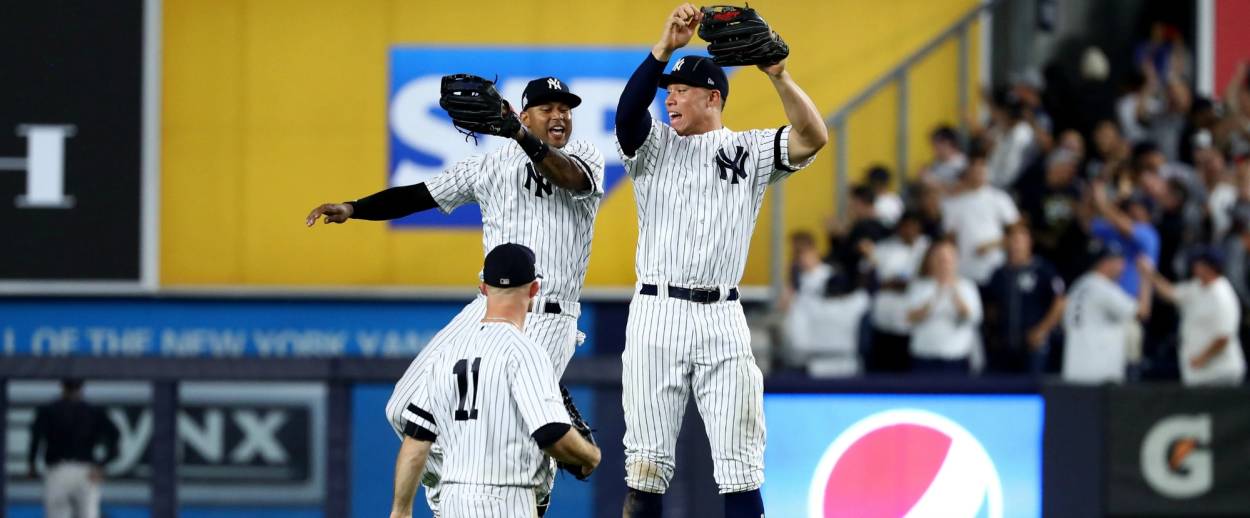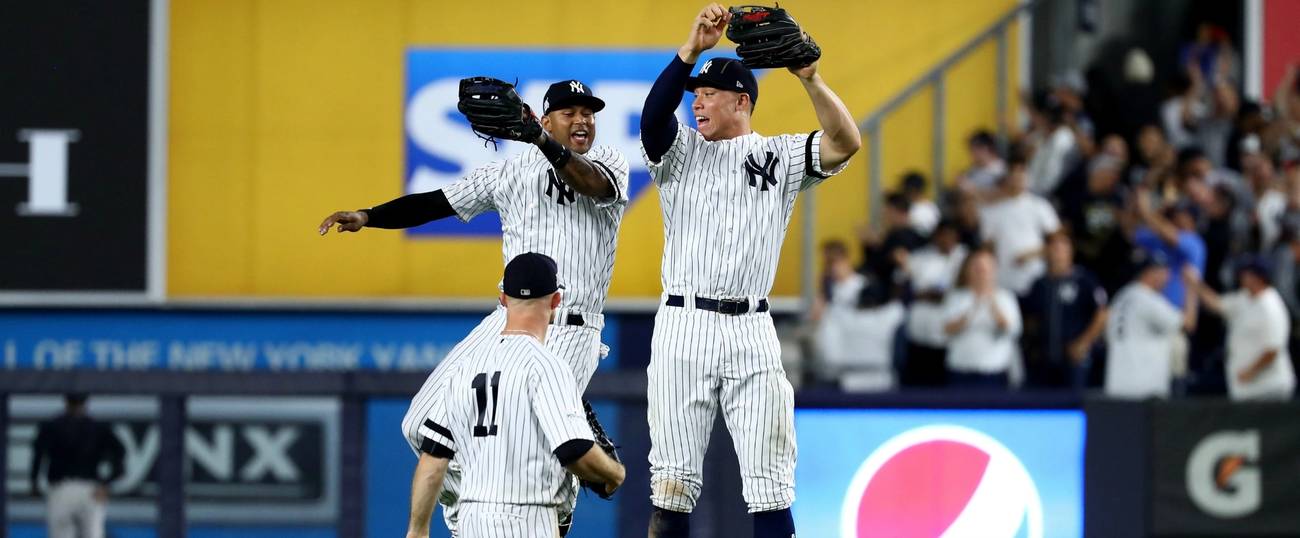Rooting for the Yankees May Be Good for Your Soul. No, Really.
I used to loathe the Bronx Bombers, until a religious epiphany taught me something about baseball, politics, and the perils of tribalism




The most instructive piece of political reporting you can read this week isn’t about Donald Trump, or North Korea, or gun control, or health care, or any of the other specters haunting our headlines these days. Instead, it’s about Aaron Judge, Didi Gregorius, Gary Sánchez, et al., which, in case you’re the sort of newspaper reader who never quite makes it all the way to the sports pages, are the men of the New York Yankees. In a beautiful piece this weekend in The Wall Street Journal, James Traub, a longtime fan, shared a useful observation about tribalism, loyalty, and what to do when observable reality refuses to conform with your prejudices.
Before I tell you his story, I’d like to tell you mine. I’m a sports guy, the sort of dude who would happily settle in to watch two elementary school teams play each other at curling. If there’s a ball or a puck or a glove, I’m intrigued, so naturally, I’m also the kind of brute who considers fandom to be made of the same sacred stuff as nationalism or religion. Whenever someone tried to shame me for my continuing loyalty to my beloved soccer club, Beitar Jerusalem, despite some of its fans’ dalliances with racism and violence, I’d shrug my shoulders and say something about my team being my team or about not being able to choose my athletic affinities any more than I can my allegiance to my own family, no matter how imperfect.
When I moved from my native Tel Aviv to New York, exactly 18 years ago this week, I realized I had to declare my loyalties to a whole new set of teams. And because baseball had always enchanted me—once upon a time, I was the feared second baseman for the Herzliya Hawks, an impromptu softball team that played no one and went nowhere—I was faced with one seminal question: Mets or Yankees?
The Yankees, as Traub himself admits in his piece, were more or less deserving of being called the Evil Empire. With George Steinbrenner inflicting his Trumpian demons on his pinstriped charges, it was hard to fall in love with the boys from the Bronx. “What kind of feelings,” Traub poignantly asks, “could you invest in these gold-plated birds of passage?” The Mets, on the other hand, were the scruffy underdogs, the fun-loving rascals who may not have the arms but always had the heart.
Or so I thought.
Slouching out to Citi Field this year, I saw, just as I had in too many years past, an exercise in chaos. With troubled relationships with ownership, a pitching staff that imploded upon contact with the mound, and an offense that made my childhood buddies in Herzliya look like World Series material in comparison, the Mets were up to no good. Sitting behind third base and drinking to forget, I asked myself the perennial question of Mets fandom: Why, again, do I root for these guys? I ask it every year. But this year was different: This year, across town, a gang of lovable, soulful kids was doing something special.
This year’s Yankees were never supposed to go anywhere. They were supposed to lay the foundation for a long rebuild. And, in the best baseball tradition, they consisted mostly of homegrown talent, young guys like Judge or Sánchez who were drafted young and allowed to grow into their power within the organization. And then, they started winning. Or, more accurately, then they started playing like true champions do, with confidence and clarity and poise. Their journey may end by the time you read these lines—as I write, the Yankees are tied 2-2 with the Cleveland Indians in the division series—but the beauty of this year will not soon be dimmed.
Which led me to a gut-wrenching conflict: Can I, in good faith, after so many years of gleefully chanting ditties I can’t possibly print in this family-friendly publication, turn around and cheer for these guys? I’ve never felt that desire before, even during the prime Jeter years, when each year seemed to bring on a new ring. What happened? Traub’s piece helped me make sense of my feelings.
“Fandom,” he writes, “of course, is a matter of tribal affiliation rather than moral calculus. I loved the Yankees because … I loved the Yankees. But fans also need to feel that their team deserves the love they shower on them. If your tribal loyalty and your moral sensibility diverge too far, you begin to find yourself feeling that the guys you’re beating are the ones who should be winning. Steinbrenner’s crusade to Make the Yankees Great Again only made fans who had stoically endured years of failure feel like victory was being bought at the expense of the qualities of spirit that make sports worth caring about.”
If your tribal loyalty and your moral sensibility diverge too far: This, for many of us, is what this moment in time is about. Some of us may be tribally loyal to the Republicans, yet morally unable to stomach the deprivations of the despicable commander in chief. Some of us may be of the left, yet are still sickened by its descent into the abyss of identity politics. Some of us may be gun nuts, yet stand uneasily with the NRA’s refusal to wage anything but a scorched-earth campaign against its enemies. Some of us may be critical of Israel, yet refuse to accept the vicious singling out of the Jewish state for all kinds of calumny. If there’s something clear in this extraordinarily murky moment in time, it’s that our tribal loyalties and our moral sensibilities are having a very rough patch in their relationship.
What to do about it? Some wise men and women argue that our fault lies not in ourselves but in our clans and that if we only abandon our primordial instinct to huddle around with like-minded humans we would truly transcend. That’s a touching sentiment, but it happens to go against more or less the entirety of human history. We are the people who pick sides, which is one reason why we love sports so much and why an earlier—and much wiser—president had it just right when he quipped that an atheist was a person who watched a Notre Dame-Southern Methodist University game and didn’t care who won.
But as the 2017 Yankees teach us so well, even as we pick sides and pledge our fidelity, we should keep an open mind and an open heart. When our side bumbles and stumbles and stinks, we should admit it. And when the other side rises and shines, we should give credit where due.
This week, I’ll be watching the playoffs wearing my brand-new Yankees cap. I’m still a Mets fan—some things are stronger than reason—but wearing the dark-blue-and-white is my small and symbolic step toward spiritual transcendence. If this country has any hope—and you can’t be an American and not believe mightily that it always does—it would likely gleam first on the pitcher’s mound or the 10-yard line or the paint. And I may not yet be ready to embrace my political adversaries, but I’m opening my heart to the young and inspired New York Yankees.
***
You can help support Tablet’s unique brand of Jewish journalism. Click here to donate today.
Liel Leibovitz is editor-at-large for Tablet Magazine and a host of its weekly culture podcast Unorthodox and daily Talmud podcast Take One. He is the editor of Zionism: The Tablet Guide.